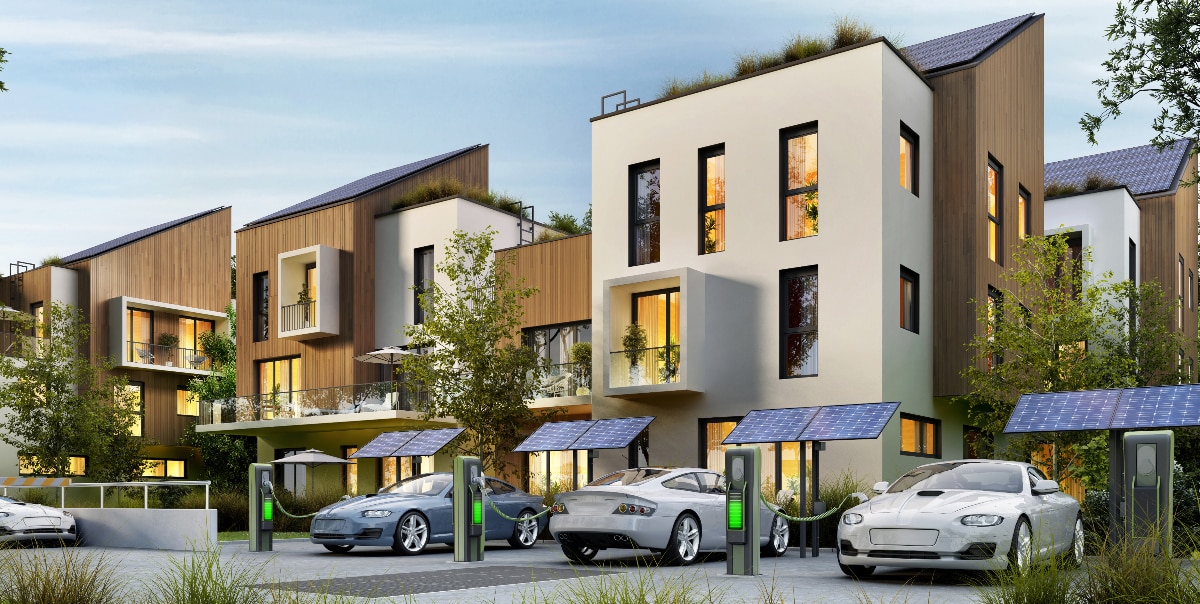EV Charging: A Vital Amenity in the Multifamily Properties of Today and the Future

5 Min. Read
4 min. read
With electric vehicle (EV) adoption on the rise, providing drivers with an EV charger solution that meets their needs in a multifamily space can seem challenging. For owners of multifamily properties, this creates an opportunity to stand out and reduce carbon emissions by exploring EV charging infrastructure options.
Why is access to EV charging critical?
Demand is growing as EV sales increase dramatically with higher gasoline prices and growing concern about climate change. In California, new car registrations for EVs in 2021 jumped 68% over the prior year. With the state moving toward 100% zero-emission vehicle sales by 2035, EV sales will continue to escalate. However, a lack of access to charging stations could slow the transition. That is one reason the U.S. government, states and utilities are promoting charger installation.
Historically over 80% of those who already drive EVs charge their vehicles at home, but charging solutions in the multifamily buildings are still not readily available. This is essentially a residential application in a commercial building, with individual charging stations simply too cost prohibitive for a single resident.. The demand for EV charging capabilities at apartment buildings and condominiums will continue to grow as EV model prices move downwards, making the purchase of an electric vehicle more attainable.
Home charging is almost always the cheapest and most convenient option. As several automakers phase out gas-powered cars, more tenants will be driving EVs in the coming years. Those who switch to electric cars and trucks earlier will expect charging stations to be available in or near their homes, as the availability and reliability of public charging remains suspect.
State incentives help recoup costs
Access to EV charging at rental properties should become more common thanks to state incentives to fund charger installations. California, Connecticut, Illinois, and Vermont are just a handful of the states that have established programs to help property owners install EV charging solutions for tenants.
- California. The leader in EV sales and charger installation is stepping up its efforts to boost EV use. To promote them for the next three years, the state has set up a $1.4 billion program to help building owners install more EV charging stations in apartments and condos. The package includes $1.5 billion to help reduce the cost of EVs. The governor’s latest budget proposal includes money for more rebates and incentives. Many counties, cities and utilities in the state also offer incentives to help multifamily buildings install charging infrastructure.
- Connecticut. Multifamily property owners with five or more units in Connecticut can apply for an incentive. The program helps recoup costs for EV equipment or infrastructure improvements needed to make a site ready for an EV charging station.
- Illinois. Starting in July, the Illinois EPA is awarding rebates or grants to cover up to 80% of the cost of installing Level 2 or Level 3 Charging Stations
- Vermont. Legislation being considered in Vermont will expand current electrification programs. The state is adding $10 million to install public EV charging stations at multifamily dwellings, community attractions and workplaces.
These are just a few of the many programs in these and other states.
Challenges for multifamily buildings
EV charger installations present some concerns unique to multi-unit properties:
- EV charging can result in a large increase in energy consumption, particularly when multiple cars are charging at once. How will the added electricity use be paid for? You may need to assign chargers to individual drivers or use charging equipment that has a payment system to ensure fairness.
- Physical access to the chargers can also be an issue. They take up space that a tightly packed parking lot with a lot of compact spots may not have. In addition, installation of chargers must meet specific American Disabilities Act requirements, in some cases reducing the amount of parking spaces available.
- Electrical updates and any changes to the parking infrastructure have to meet local codes for rentals. Also, in older buildings, the electrical wiring may be outdated and need upgrades, which can add considerably to the cost of installation.
- Today’s residents often prefer to live in communities that provide green amenities. Keep your tenants happy and attract new ones by offering EV charging convenience.
Affordable solutions for multifamily property owners
Older buildings typically require a more extensive upgrade with a new 200-amp panel. Smart panels are an option to consider since they have additional benefits for rental properties. A Level 2 Charging Station typically requires a dedicated 40-amp circuit in the building’s electrical panel.
Upgrading a property with EV chargers will likely require some changes to the parking infrastructure. For example, trenching for laying electrical conduits to any EV charging station can add to the cost of installation. While it’s ideal, running conduit above ground is not always possible.
ROI is an important consideration, and EV charging will increase utility bills for the property. Owners can use cost-management measures like a load management system that can increase the amount of charger installed while requiring less extensive infrastructure upgrades.. If the EV chargers are tied to a payment system, it eliminates hassle over costs and allows the owner to generate additional revenue from visitors to the complex.
A convenient EV charger solution can be the first step toward electrification and reduced carbon emissions. Other projects to explore include a smart panel upgrade, modernized lighting throughout the property, compartment units, improvements to the building envelope and investments in solar energy.
A partner you can trust
Before you launch an effort to add multifamily EV charging to your property, it is essential to partner with an experienced company, such as Qmerit, to assess the residents’ unique needs, recommend the right product, and establish a realistic budget and project plan.
Qmerit is a national leader with a network of certified installers throughout the U.S. and Canada who have experience with multifamily properties and EV charging requirements. Our dedicated customer care specialists provide expert installation and white-glove service every step of the way. If you are a multifamily property owner, contact Qmerit today to find out more about our EV charging solutions and prepare your building for the future.
